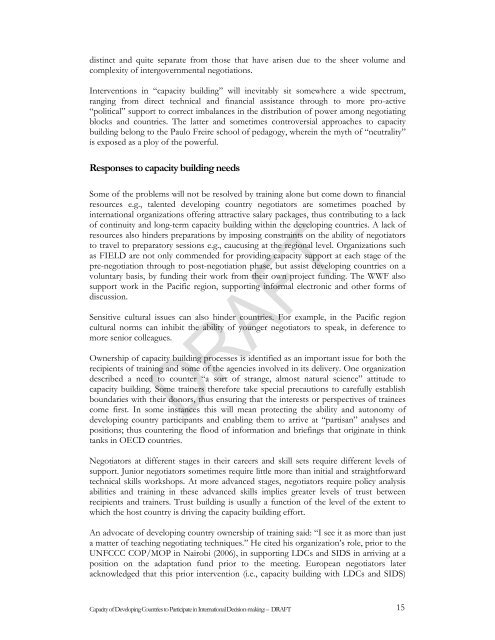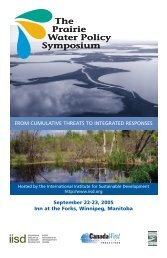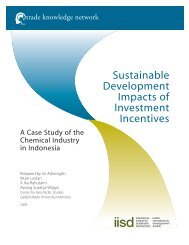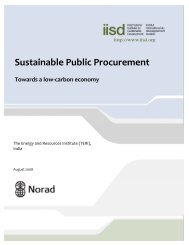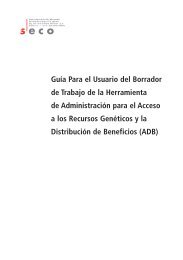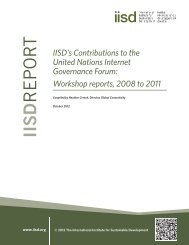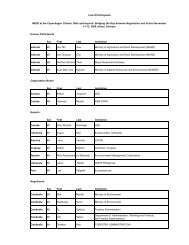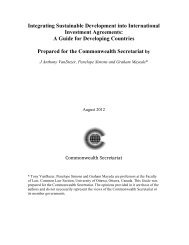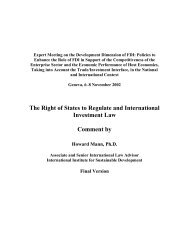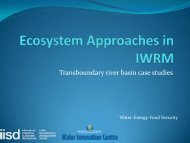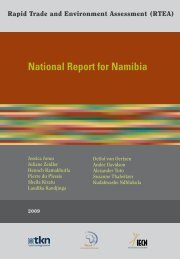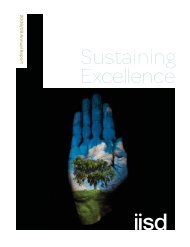Capacity of Developing Countries to Participate in International ...
Capacity of Developing Countries to Participate in International ...
Capacity of Developing Countries to Participate in International ...
You also want an ePaper? Increase the reach of your titles
YUMPU automatically turns print PDFs into web optimized ePapers that Google loves.
dist<strong>in</strong>ct and quite separate from those that have arisen due <strong>to</strong> the sheer volume and<br />
complexity <strong>of</strong> <strong>in</strong>tergovernmental negotiations.<br />
Interventions <strong>in</strong> “capacity build<strong>in</strong>g” will <strong>in</strong>evitably sit somewhere a wide spectrum,<br />
rang<strong>in</strong>g from direct technical and f<strong>in</strong>ancial assistance through <strong>to</strong> more pro-active<br />
“political” support <strong>to</strong> correct imbalances <strong>in</strong> the distribution <strong>of</strong> power among negotiat<strong>in</strong>g<br />
blocks and countries. The latter and sometimes controversial approaches <strong>to</strong> capacity<br />
build<strong>in</strong>g belong <strong>to</strong> the Paulo Freire school <strong>of</strong> pedagogy, where<strong>in</strong> the myth <strong>of</strong> “neutrality”<br />
is exposed as a ploy <strong>of</strong> the powerful.<br />
Responses <strong>to</strong> capacity build<strong>in</strong>g needs<br />
Some <strong>of</strong> the problems will not be resolved by tra<strong>in</strong><strong>in</strong>g alone but come down <strong>to</strong> f<strong>in</strong>ancial<br />
resources e.g., talented develop<strong>in</strong>g country negotia<strong>to</strong>rs are sometimes poached by<br />
<strong>in</strong>ternational organizations <strong>of</strong>fer<strong>in</strong>g attractive salary packages, thus contribut<strong>in</strong>g <strong>to</strong> a lack<br />
<strong>of</strong> cont<strong>in</strong>uity and long-term capacity build<strong>in</strong>g with<strong>in</strong> the develop<strong>in</strong>g countries. A lack <strong>of</strong><br />
resources also h<strong>in</strong>ders preparations by impos<strong>in</strong>g constra<strong>in</strong>ts on the ability <strong>of</strong> negotia<strong>to</strong>rs<br />
<strong>to</strong> travel <strong>to</strong> prepara<strong>to</strong>ry sessions e.g., caucus<strong>in</strong>g at the regional level. Organizations such<br />
as FIELD are not only commended for provid<strong>in</strong>g capacity support at each stage <strong>of</strong> the<br />
pre-negotiation through <strong>to</strong> post-negotiation phase, but assist develop<strong>in</strong>g countries on a<br />
voluntary basis, by fund<strong>in</strong>g their work from their own project fund<strong>in</strong>g. The WWF also<br />
support work <strong>in</strong> the Pacific region, support<strong>in</strong>g <strong>in</strong>formal electronic and other forms <strong>of</strong><br />
discussion.<br />
Sensitive cultural issues can also h<strong>in</strong>der countries. For example, <strong>in</strong> the Pacific region<br />
cultural norms can <strong>in</strong>hibit the ability <strong>of</strong> younger negotia<strong>to</strong>rs <strong>to</strong> speak, <strong>in</strong> deference <strong>to</strong><br />
more senior colleagues.<br />
Ownership <strong>of</strong> capacity build<strong>in</strong>g processes is identified as an important issue for both the<br />
recipients <strong>of</strong> tra<strong>in</strong><strong>in</strong>g and some <strong>of</strong> the agencies <strong>in</strong>volved <strong>in</strong> its delivery. One organization<br />
described a need <strong>to</strong> counter “a sort <strong>of</strong> strange, almost natural science” attitude <strong>to</strong><br />
capacity build<strong>in</strong>g. Some tra<strong>in</strong>ers therefore take special precautions <strong>to</strong> carefully establish<br />
boundaries with their donors, thus ensur<strong>in</strong>g that the <strong>in</strong>terests or perspectives <strong>of</strong> tra<strong>in</strong>ees<br />
come first. In some <strong>in</strong>stances this will mean protect<strong>in</strong>g the ability and au<strong>to</strong>nomy <strong>of</strong><br />
develop<strong>in</strong>g country participants and enabl<strong>in</strong>g them <strong>to</strong> arrive at “partisan” analyses and<br />
positions; thus counter<strong>in</strong>g the flood <strong>of</strong> <strong>in</strong>formation and brief<strong>in</strong>gs that orig<strong>in</strong>ate <strong>in</strong> th<strong>in</strong>k<br />
tanks <strong>in</strong> OECD countries.<br />
Negotia<strong>to</strong>rs at different stages <strong>in</strong> their careers and skill sets require different levels <strong>of</strong><br />
support. Junior negotia<strong>to</strong>rs sometimes require little more than <strong>in</strong>itial and straightforward<br />
technical skills workshops. At more advanced stages, negotia<strong>to</strong>rs require policy analysis<br />
abilities and tra<strong>in</strong><strong>in</strong>g <strong>in</strong> these advanced skills implies greater levels <strong>of</strong> trust between<br />
recipients and tra<strong>in</strong>ers. Trust build<strong>in</strong>g is usually a function <strong>of</strong> the level <strong>of</strong> the extent <strong>to</strong><br />
which the host country is driv<strong>in</strong>g the capacity build<strong>in</strong>g effort.<br />
An advocate <strong>of</strong> develop<strong>in</strong>g country ownership <strong>of</strong> tra<strong>in</strong><strong>in</strong>g said: “I see it as more than just<br />
a matter <strong>of</strong> teach<strong>in</strong>g negotiat<strong>in</strong>g techniques.” He cited his organization’s role, prior <strong>to</strong> the<br />
UNFCCC COP/MOP <strong>in</strong> Nairobi (2006), <strong>in</strong> support<strong>in</strong>g LDCs and SIDS <strong>in</strong> arriv<strong>in</strong>g at a<br />
position on the adaptation fund prior <strong>to</strong> the meet<strong>in</strong>g. European negotia<strong>to</strong>rs later<br />
acknowledged that this prior <strong>in</strong>tervention (i.e., capacity build<strong>in</strong>g with LDCs and SIDS)<br />
<strong>Capacity</strong> <strong>of</strong> <strong>Develop<strong>in</strong>g</strong> <strong>Countries</strong> <strong>to</strong> <strong>Participate</strong> <strong>in</strong> <strong>International</strong> Decision-mak<strong>in</strong>g: – DRAFT 15


